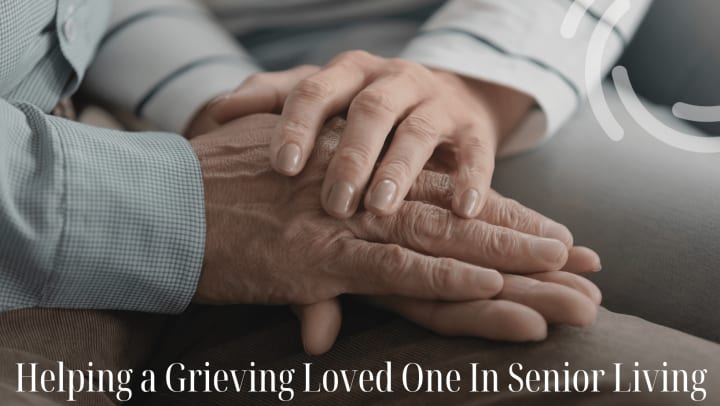Helping a grieving loved one in senior living requires patience, empathy, and understanding. Coping with grief is challenging no matter where a person resides or how old they are. For older individuals, senior living communities can provide built-in support systems that may help lessen the heartache and give adult children and families peace of mind knowing that their parent isn’t alone.
Oftentimes, as couples grow older together, one partner may find themselves taking on the role of caregiver for the other. This dynamic can further complicate the experience of grief and loss. When one spouse passes away, the surviving partner may feel loss in many areas, including the loss of memories, their sense of independence, and financial stability. Living on their own can be lonely and isolating. Having companions and neighbors who have shared a similar journey, participating in a variety of purposeful activities, and transitioning to or living in a senior living community provides many benefits.
When you are watching a senior family member struggle with the death of a loved one, you may feel helpless, especially if you are also going through the grieving process. While the journey through grief and loss is unique for each person, there are many ways you can support your loved one as they navigate this challenging period.
The Five Stages of Grief
The five stages of grief, also known as the Kübler-Ross model or the five stages of mourning, were introduced by psychiatrist Elisabeth Kübler-Ross in her 1969 book "On Death and Dying." These stages create a framework to describe the emotional and psychological process individuals often go through when faced with the loss of a loved one. Not everyone experiences all these stages, and they don't necessarily occur in any kind of order. People can move back and forth between stages, skip one or more of them, or spend varying amounts of time in each stage.
- Denial. This is often the first reaction to a loss. Individuals in mourning may have difficulty accepting the reality of what happened. Feeling shocked, numb, or as though the situation isn't real is a normal part of the grieving process. Denial serves as a protective mechanism that allows individuals to gradually absorb the overwhelming news.
- Anger. As denial begins to fade, the pain of loss becomes more pronounced. This can lead to feelings of frustration, anger, and resentment, which can be directed toward themselves, others, or even the person who has passed away. This stage can be marked by a sense of unfairness or injustice.
- Bargaining. Individuals enter a bargaining phase to regain control or reverse the loss. They may turn to spirituality, fate, or the universe in hopes of changing the outcome. This stage often involves "what if" and "if only" statements, as well as feelings of guilt about things left unsaid or undone.
- Depression. As the reality of the loss sets in, a deep sadness and loneliness can take hold. This stage involves feelings of emptiness, despair, and isolation. Individuals who are grieving might withdraw from social interactions and experience changes in appetite, sleep patterns, and energy levels.
- Acceptance. This stage signifies coming to terms with the reality of the situation and finding a way to move forward. Individuals may start to find a new sense of purpose or meaning in life as they adjust to their new reality without the person they lost.
Supporting a Loved One Through Grief
As you help your loved one through the stages of grief, it’s important to recognize you may be grieving yourself. Remember to give yourself the time and space you need to process your loss while also caring for your parent. Here are a few ways you can provide support through this difficult time.
- Provide physical support. Spend time with your loved one, whether it’s through visits, phone calls, or video chats. Your presence can provide comfort and reassurance. Your loved one may also need help with coordinating funeral arrangements and communicating plans with friends and family.
- Show emotional support. Grief can manifest itself in ways that may not always be rational. If you cannot physically be present, consider checking in more consistently with phone or video calls. The best thing you can do during this time is to be patient and kind and lend an ear. Even after the initial period of grief, continue to stay in touch and provide support. Grief can resurface during significant life events or milestones. Honor the loved one’s memory by reminiscing about the person who passed away. Sharing stories and anecdotes can help celebrate their life and keep their memory alive.
- Be empathetic and patient. Coping with loss is a personal journey, and there’s no right way to grieve. Allow your loved one to mourn at their own pace in their own way. Encourage them to take it one day at a time and be kind to themselves. On days they feel like seeing a movie or going shopping, they should do so. But on days when their sense of loss is overwhelming, talk through their feelings with them. While it’s important to be present, respect their need for solitude. Grieving individuals sometimes need time alone to process their emotions.
- Prioritize health. Grief and loss can have a huge impact on overall wellness. You may notice your parent acting more confused than normal, having trouble concentrating, or feeling physically unwell. These are all very common symptoms; however, grief can sometimes lead to clinical depression. If you notice signs such as prolonged sadness, withdrawal, or severe changes in appetite or sleep patterns, consider professional help for your loved one. Grief counseling or therapy can provide them with tools to navigate their emotions.
- Encourage them to keep moving. Grief can take over someone very quickly. It’s important to urge them to take care of themselves by making sure they eat and move around during the day. This not only helps a loved one get back into the daily routine of life, but it also offers a break from the grieving process for a little while. Acknowledge and celebrate even small steps forward in their healing journey. This can encourage them to continue making positive strides.
- Help them connect with a support system: Surviving spouses and partners often find it helpful to connect with others who have experienced a similar loss. Hospice agencies have bereavement groups for spouses, children, and others to join. These are available even if you didn’t utilize the organization’s end-of-life care services. Help your loved one connect with friends, other residents, or support groups within their senior living community. Sharing experiences with others who are going through similar situations can be therapeutic.
- Self-care. Lastly, don’t forget to take care of yourself too. Supporting a grieving loved one can be emotionally taxing, so make sure you have your own support system in place.
It’s not uncommon for those who live in senior living communities to experience grief on a regular basis. Knowing how to help seniors cope and deal with their sadness may make the loss a little more manageable for everyone involved. Grief is a process that takes time. Your presence, empathy, and willingness to listen can make a significant difference in your loved one's healing process.





